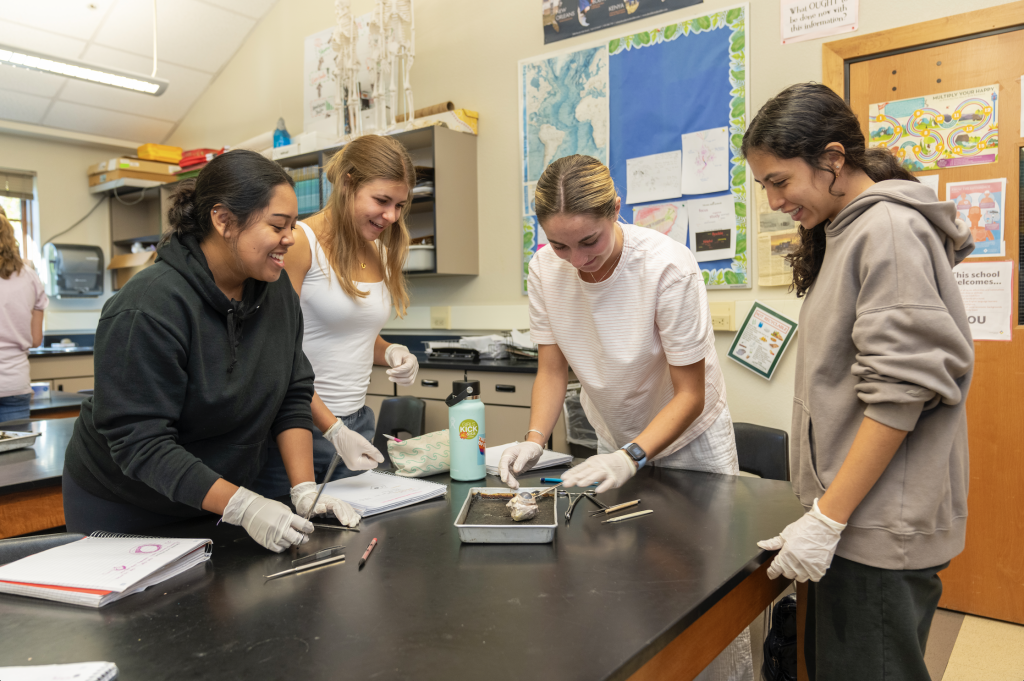Here’s a wake-up call for parents: Most teenagers aren’t getting enough sleep
For teens, lack of sleep can impact everything from their ability to learn to their decision making capacity

Zoe Goldstein/Vail Daily
Most parents know that their teens are not getting enough sleep. But how much does sleep deprivation really matter if kids are still able to function? And what can families do to help their kids get more sleep?
Lisa L. Lewis, a journalist who helped fight for— and win — later school start times in California, literally wrote the book on the matter. She reprised some of the most important points from her 2022 book, “The Sleep-Deprived Teen,” in a talk at Vail Mountain School on Nov. 6.
“There is nothing we do better as a result of being sleep deprived,” Lewis said.
“It’s not that you can’t get by on less sleep — we do, often — but you are not functioning at your best,” Lewis said.
How sleep-deprived are teens?
For teenagers, a lack of sleep can have adverse effects on everything from their ability to learn in school to their impulse control and driving safety.
“There are some high schools out there where first period starts at 7 a.m.,” Lewis said. “That is counter to best practices.”
The American Academy of Sleep Medicine recommends that kids aged 6 to 12 get between 9 and 12 hours of sleep per day. Teens ages 13 to 18 should get 8 to 10 hours of sleep each day.
Ahead of her talk, Lewis had Vail Mountain School middle and upper school students complete a sleep survey. Most students acknowledged they were not getting enough sleep — nearly three-quarters of middle schoolers said they were going to bed later than they wanted, due to homework, getting home late from sports and other activities, and losing track of time. For upper schoolers as well, homework and arriving home late from activities reduced their sleep time.
More than 25% of middle schoolers said they struggled to fall asleep due to trouble winding down, anxiety about school and challenges in their physical sleeping environment, while upper schoolers were anxious or stressed about school.
The bulk of middle schoolers reported getting eight to nine hours of sleep, though more than a third reported getting less than eight hours per night. Forty-five percent of high schoolers reported sleeping seven to eight hours per night, though they slept more on late-start days.
Why sleep is essential for teens
Sleep is “not a waste of time,” Lewis said.
For everyone, but for adolescents in particular, sleep is essential for processing and storing information, growth and healing processes, appetite regulation, pruning brain cells and strengthening connections between brain cells.
“When they’re not getting enough sleep … it has such far-reaching implications for all aspects of functioning — their academic performance, their sports performance, their driving, their decision making,” Lewis said.
For teens, whose main job is usually studying, a lack of sleep limits their ability to acquire, retain, and recall information.
A study of MIT undergraduates showed that “the students who are getting more sleep and better sleep the entire month leading up to midterms, those are the students who actually got better grades,” Lewis said. “Consistency of sleep is part of the quality.”
Sleep also allows students to start the day “with a full emotional tank.”
Sleep is essential for “flourishing, which is basically being able to be your best self out in the world,” Lewis said.
Stressors register more deeply when teens have not gotten enough sleep, making them feel emotions and events more intensely.
Lack of sleep also exacerbates mental health issues.
Unlike adults, teens’ prefrontal cortices are not yet fully developed, which limits their ability to regulate emotions. Lack of sleep “lowers the barrier for impulsive behaviors, which can have absolutely devastating consequences,” Lewis said.

For athletes, “sleep is a competitive advantage,” Lewis said.
A study of the Stanford men’s basketball team found that when team members increased their nightly sleep from under seven hours to over 8.5 hours, their athletic performance improved by 9%. The increase in sleep was achieved by asking the student-athletes to spend 10 hours per night in bed.
Sleep also improves coordination, which helps protect against injury, and aids in the healing process post-injury.
Getting consistent sleep also matters in the long term for cardiovascular health and longevity.
How to help students get more sleep
Finding ways to get teens more sleep starts with understanding that teens’ circadian rhythms are different — shifted later — than adults’ and kids’.
Melatonin, the hormone that tells the body to induce sleep, begins to be released hours before bedtime. In teens, melatonin is released later, meaning they do not get tired until later in the evening than their parents and younger siblings.
“You can put a 16-year-old to bed at 9 o’clock, but unless they’re already exhausted, they’re going to lay there and just kind of stare at the ceiling,” Lewis said.
But most teenagers still have to be awake and in attendance when school starts early in the morning.
“You can see how their sleep starts getting squeezed. They have to get up for school, meanwhile, they’re not getting tired (at night),” Lewis said.
Though tempting, making up for missed sleep on the weekends is not an effective strategy, Lewis said. If teens sleep in, they might not be able to fall asleep until late at night, “and that just ends up perpetuating the cycle,” Lewis said. “It’s akin to actual jet lag.”
While an individual family may not be able to change what time school starts, families can control what happens at home at night.
One of the biggest reasons the surveyed Vail Mountain School teens said they cannot get enough sleep is schedule overload — they are doing too many activities and too much homework.
“If they’re feeling overwhelmed, we want them to feel OK with coming to us to say that, to come and get help,” Lewis said.
To combat this, Lewis suggested parents work with their teens to write down where their hours are going, splitting the 24 hours of a day into time spent at school, doing homework, at sports and other activities, and doing life things like eating and bathing.
“Then you see what’s left. And if that remaining piece is less than … eight to 10 hours, that means they don’t even have the opportunity to be able to get enough sleep. And that may be a sign that it’s time to re-evaluate,” Lewis said.
Lewis also suggested parents regulate their teens’ use of technology, as technology can disrupt sleep in three ways: Taking up time, restimulating the brain and emitting blue light.
“If you have turned off the light and you are still online, you are cutting into your sleep time,” Lewis said.
If students are doing homework late into the night, it is cueing their brains to stay awake. So is blue light, which, while not inherently bad, cues people to feel alert by telling melatonin to subside.
The American Academy of Pediatrics recommends disconnecting from devices an hour before bedtime. If an hour is not possible, families can do less time, “but find some sort of buffer of time” between technology use and sleep, Lewis said.
Keeping phones out of the bedroom is an easy way to improve sleep habits.
To help teens wind down, Lewis suggested they try tech-free strategies, such as writing a to-do list for the next day or reading a book.
Lewis also suggested parents set bedtimes for their students and lower the lights throughout the home as bedtime approaches.
“The ideal sleep environment is one that is cool, dark and quiet,” Lewis said.
Original reporting from Vail Daily

Support Local Journalism

Support Local Journalism
Readers around Glenwood Springs and Garfield County make the Post Independent’s work possible. Your financial contribution supports our efforts to deliver quality, locally relevant journalism.
Now more than ever, your support is critical to help us keep our community informed about the evolving coronavirus pandemic and the impact it is having locally. Every contribution, however large or small, will make a difference.
Each donation will be used exclusively for the development and creation of increased news coverage.










